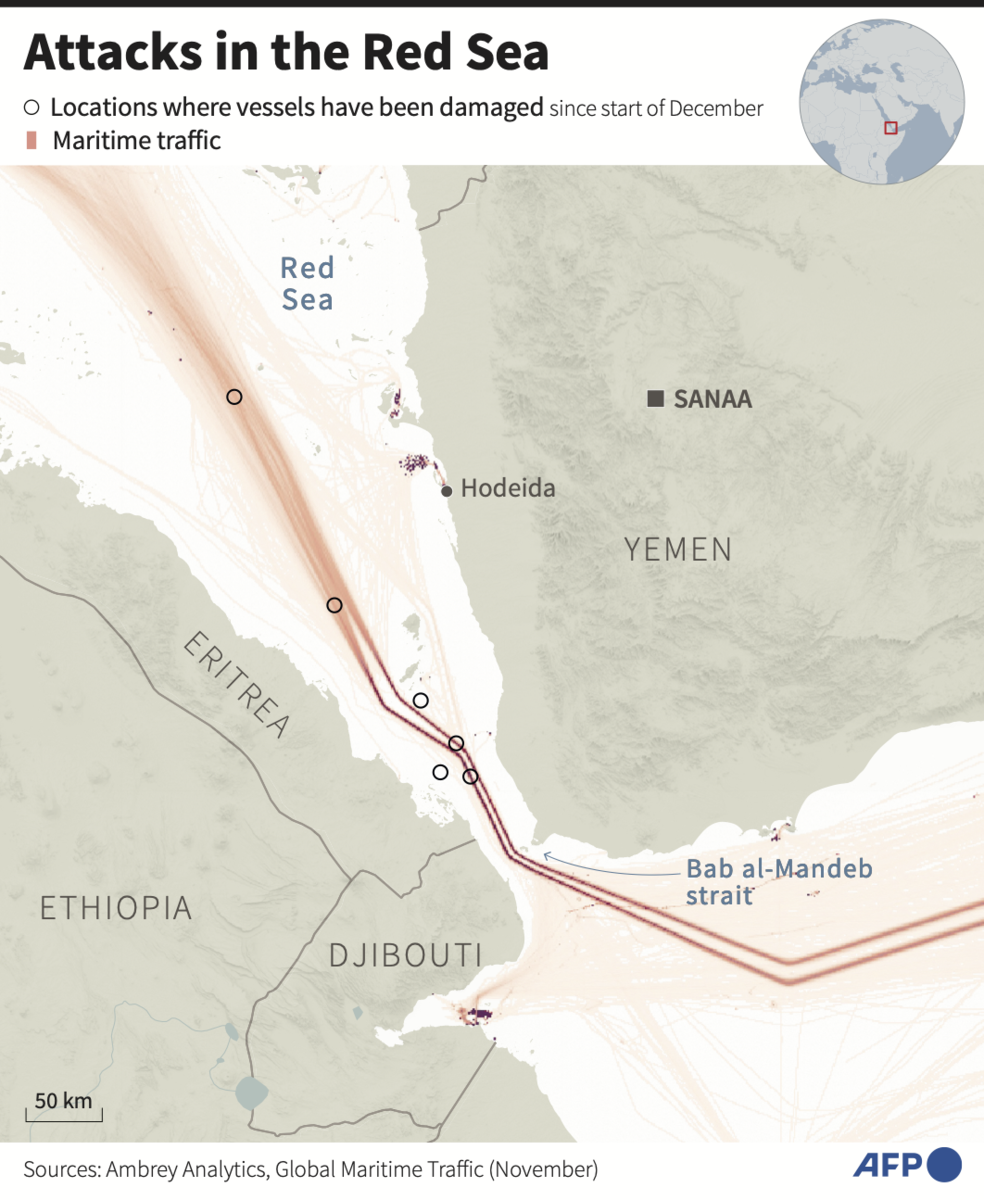LONDON/MADRID: Exporters are scrambling to find alternative air, land and ocean routes to get toys, apparel, tea and auto parts to retailers as disarray ripples through freight supply chains around the world during a wave of attacks in the Red Sea.
Iran-backed Houthi militants in Yemen have stepped up attacks on vessels in the Red Sea since Nov. 19 to show support for Hamas during Israel’s military offensive in Gaza.
The attacks have disrupted a key trade route linking Europe and North America with Asia via the Suez Canal. Container shipping costs have surged, more than tripling in some cases, as companies seek to move goods via other, often longer, ocean routes.
If there are extended disruptions, the consumer goods sector that supplies the world’s top retailers like Walmart and IKEA will face the biggest impact, S&P Global said in a report.
Alan Baer, CEO of OL USA, has teams advising shipping and logistics clients to prepare for at least 90 days of Red Sea disruptions.
“It doesn’t help that it’s Christmas weekend,” said Baer. “We’ll have a quiet period from now until Jan. 2, and then everybody will be frenetic.”
Some fast-acting companies already are trying to switch to so-called intermodal transport, which can involve two or more modes of transportation, said Jan Kleine-Lasthues, chief operating officer airfreight with leading German freight forwarder Hellmann Worldwide Logistics.

Hellmann has seen increased demand for combined air and sea routing for consumer goods like apparel as well as electronics and tech items, he said. For example, that could mean goods being transported first by sea to a port in Dubai, where they are then loaded onto planes.
“This alternative route allows customers to avoid the danger zone in the Red Sea and the long voyage around the southern tip of Africa,” Kleine-Lasthues told Reuters.
While companies moving urgent or critical items might opt to use air freight, the expense means it is not a blanket solution, said Paul Brashier, vice president of Drayage and Intermodal for supply chain group ITS Logistics.
Moving goods by air costs roughly 5-15 time more than by sea, where container shipping rates are still low by historical standards, said Brian Bourke, global chief commercial officer at SEKO Logistics.
If the time it takes to get goods to shelves doubles, more shippers will switch to air — especially for high value goods like designer clothing and high-end electronics, said Bourke, who has already received queries from customers.
Major trade route
Some 35,000 vessels sail through the Red Sea region annually, moving goods between Europe, the Middle East and Asia, representing about 10 percent of global GDP, said Corey Ranslem, CEO of British maritime risk advisory and security company Dryad Global.
US retailers including Walmart, Target, Macy’s and Nike depend on the route to get goods ranging from cotton sheets and electric toothbrushes from India to footwear from China and Sri Lanka.
“Under an extended threat you will see the price of fuel and goods into Europe increase substantially because of the increased costs of diverting around Africa which can add roughly 30 days to a transit depending on the arrival port,” Ranslem said.
Tailwind Shipping Lines, a subsidiary of German discount supermarket chain Lidl, which transports non-food goods for Lidl as well as goods for third-party customers, said it was shipping goods around the Cape for now.
“Our aim is to remain as close to our schedule as possible,” it said.
Shipping companies remain in the dark over a new international navy coalition being assembled by the United States aimed at stablizing the area.
A Spanish fashion industry source told Reuters shipping lines were telling customers a lot was riding on the US-led task force and whether it can prevent more attacks and make the route safe again.
It is critical that European companies are able to use the Suez Canal again to ensure supplies of clothes from Asia, the industry source said.
The timing of the Red Sea security issues compounds difficulties for shippers, said Jeb Clulow, partner in law firm Reed Smith’s transportation industry group.
The Panama Canal is struggling with severe drought and has slashed the number of ship passages it allows. In addition, there is a race to get goods in transit before Chinese New Year factory closures planned for Feb. 10-17, which can disrupt supplies for a month or longer.
Meanwhile, large container ship owners have begun adding fees, including emergency surcharges, for cargo affected by the Red Sea disruptions.
In a customer notice on Wednesday, French shipping group CMA CGM announced fees of $1,575 per 20-foot container, $2,700 per 40-foot container and $3,000 for refrigerated containers and special equipment for cargo traveling to and from Red Sea ports.






























